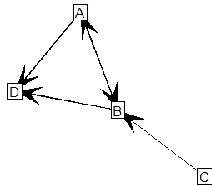Mixed-Membership Stochastic Block-Models for Transactional Networks
Paper and Code
Oct 07, 2010



Transactional network data can be thought of as a list of one-to-many communications(e.g., email) between nodes in a social network. Most social network models convert this type of data into binary relations between pairs of nodes. We develop a latent mixed membership model capable of modeling richer forms of transactional network data, including relations between more than two nodes. The model can cluster nodes and predict transactions. The block-model nature of the model implies that groups can be characterized in very general ways. This flexible notion of group structure enables discovery of rich structure in transactional networks. Estimation and inference are accomplished via a variational EM algorithm. Simulations indicate that the learning algorithm can recover the correct generative model. Interesting structure is discovered in the Enron email dataset and another dataset extracted from the Reddit website. Analysis of the Reddit data is facilitated by a novel performance measure for comparing two soft clusterings. The new model is superior at discovering mixed membership in groups and in predicting transactions.
 Add to Chrome
Add to Chrome Add to Firefox
Add to Firefox Add to Edge
Add to Edge